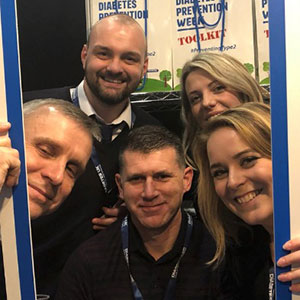Working together to prevent Type 2 diabetes
 Bringing people and organisations together is a key part of our work to support the NHS Diabetes Prevention Programme (NHS DPP) on the North West Coast.
Bringing people and organisations together is a key part of our work to support the NHS Diabetes Prevention Programme (NHS DPP) on the North West Coast.
Covering Lancashire and South Cumbria and Cheshire and Merseyside, we have a team of five people focusing on different elements of the diabetes agenda and we’re embedded in both Sustainability and Transformation Partnerships (STPs).
Our role as a strategic clinical network is to work with commissioners, providers and service users to bring about improvements to health, encourage innovation and reduce inequalities in major areas of health and wellbeing, including cardiovascular, cancer, maternity and mental health.
Diabetes is one of our key priorities and we currently have four NHS DPP sites – the wave one sites in Cheshire and Wirral, Sefton and St Helens, plus Lancashire and South Cumbria STP, which joined the programme in wave two.
Traditionally, we’ve had a quality improvement role but more recently strategic clinical networks have taken on the assurance role for NHS England. Everyone has a slightly different model for delivering this, but we deliver both functions together as a team. We know it will be a battle to remain on neutral ground, but we’re positioning ourselves as a critical friend, providing support while looking for changes and detecting problems early so they can be addressed.
One of our NHS DPP areas is struggling to meet referral targets because of some real challenges with their demographics and local geography. Yet uptake of referrals is excellent so their work is clearly well targeted. It’s our job to help them build on what they’re doing well and see how we can bring them closer to their referral targets. One way we can support them is through the collaborative sharing events we hold regularly across the North West Coast to bring good practice together.
We currently have three distinct NHS DPP sites in Cheshire and Merseyside, but that’s all about to change with the move towards the programme being delivered on an STP footprint. Over recent months, we have worked hard to bring partners together across Cheshire and Merseyside in readiness for becoming a wave 3 site.
It’s a huge area – the second largest STP in England – but we have used our established relationships to get people to a place where they can deliver. It sounds simple to say get together and take it forward but often this can be easier said than done. We’ve listened to their concerns and helped them to collectively develop a prospectus for providers.
What makes it work for us is having a named lead and a steering group for each area within our region. We each build strong relationships by regularly getting out to meet our CCG and Trust colleagues and we use those contacts when we need to bring people together. And, if we can’t get people together we begin the work for them to progress, drafting documents and taking these out to each organisation so that everyone can contribute.
Over the past year we have also:
- supported 28 bids for the national £44 million Transformation Fund to improve diabetes care, including an STP-wide bid for Lancashire and South Cumbria to improve uptake of structured education for people with Type 2 diabetes. We’re working with patient groups to understand how people want to receive information and the barriers to taking part and will then work with the provider to improve access.
- worked across Cheshire and Merseyside to standardise access to paediatric insulin pumps. Patients who’d used an omnipod – a small lightweight pump without tubes – since the age of five had to stop when they turned 18 because it wasn’t on every CCG’s approved equipment list for adults. We ran sessions with adult and paediatric care representatives across Cheshire and Merseyside and got the policy changed so omnipods could be on everyone’s approved lists.
- developed diabetes adult guidelines for GPs who don’t deal with diabetes very often, working with St Helen’s CCG and now expanding it to the whole of the North West Coast.
- started to develop a footcare e-learning resource for nurses across the North West Coast.
Next, we are exploring a potential pilot for a diet trial to reverse Type 2 diabetes. Because we have built expertise, we have time to explore new areas. People are coming to us with issues we can help with and we set up task and finish groups on specialist areas.
Patient engagement is a new focus for us. We have small patient groups but need more people with difference types of diabetes and from different backgrounds. We’re establishing a virtual patient group on Twitter working in partnership with Diabetes UK, engaging with current groups, hospital groups and groups run by the charity.
The most rewarding thing for us is seeing how much we can make things change. In CCGs we see how difficult it can be to make change happen. Working across the network, we help people to get things implemented. We know that if you can prevent even one person from getting diabetes you are changing their life and that’s an amazing achievement.
Paul Mackenzie, Senior Network Manager, North West Coast Strategic Clinical Network.
